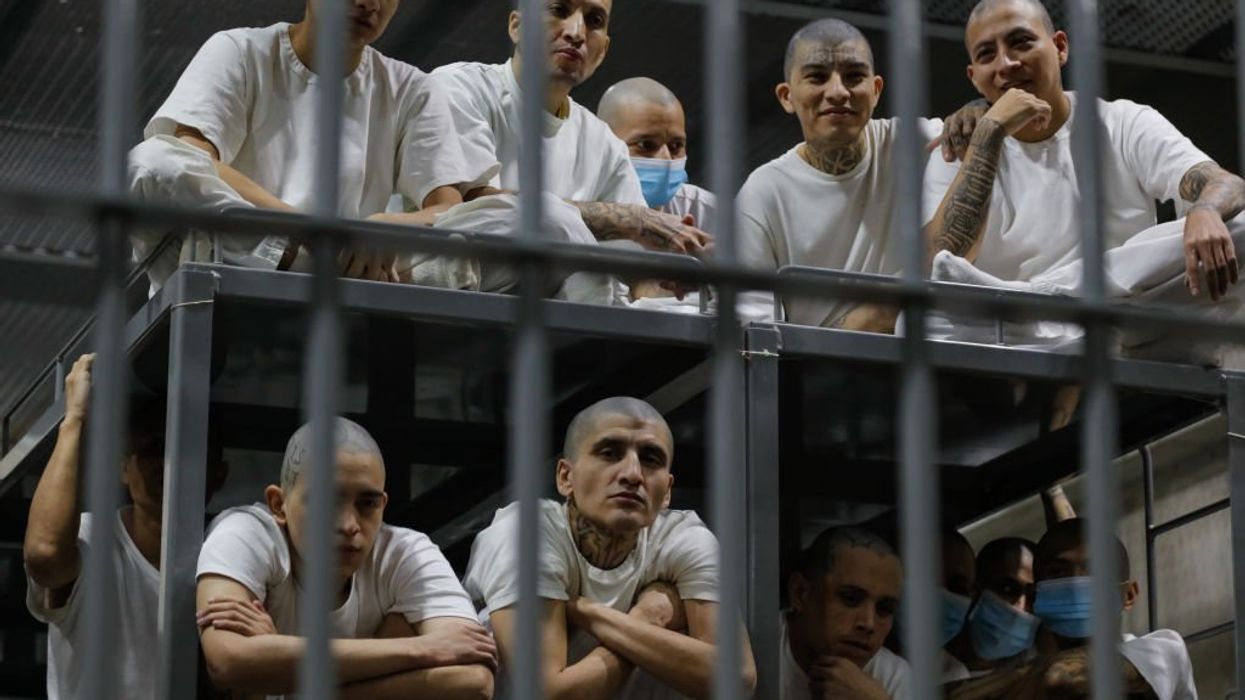
Gang members in a Latin American prison. Photo by Alex Peña/Getty Images

The Times made a number of presumptions, including that the terrorist cartels are long for this world.
Mexican drug cartels are responsible for the untimely deaths of hundreds of thousands of people over the past two decades. When factoring in the fentanyl they smuggle into the United States, the cartels are also culpable for the deaths of over 200 Americans a day. In addition to dealing in murder and addiction, they routinely engage in mass kidnappings, rape, torture, and political intimidation.
Evidently keen for a change, President Donald Trump issued an executive order on Monday setting the stage for Mexican cartels as well as other criminal gangs operating in the Western hemisphere, including MS-13, to be designated foreign terrorist organizations.
The New York Times, afforded an opportunity with a new year and a new administration to embrace common sense, instead reverted to its old ways on Wednesday, concern-mongering about the economic impact of Trump's plan to identify and hold terrorists accountable.
The piece in the Times — a paper compromised by the CIA during the Cold War, reflexively willing to print Hamas propaganda, and instrumental in recent Democratic attacks on conservative Supreme Court justices — stated at the outset that "President Trump's executive order designating Mexican cartels and other criminal organizations as foreign terrorists could force some American companies to forgo doing business in Mexico rather than risk U.S. sanctions."
Maria Abi-Habib and Simon Romero of the Times, both based in Mexico City, suggested that American companies fearing sanctions might think twice about doing business south of the border, especially with terrorists involved at various levels in supposedly legal industries, "from avocado farming to the country's billion-dollar tourism industry." The terrorist designation will make it easier to prosecute businesses and individuals suspecting of aiding the cartels, which could come down to transferring money to a compromised Mexican entity.
Fabian Teichmann, an expert on terrorist financing, told the Times that banks might be among the organizations that will ultimately decide it's no longer worth doing business with potential cartel members.
"Banks might say, 'We don't want to be anywhere close to those who are considered to be terrorists, so we want to avoid that risk,'" said Teichmann. "From a banking perspective, that will be a very reasonable decision."
'The Cartels' activities threaten the safety of the American people, the security of the United States, and the stability of the international order.'
There are, of course, steps businesses can take to avoid working with terrorists.
The American firm FTI Consulting noted in a recent report that "the potential FTO designations underscore the urgent need for heightened due diligence when engaging with third parties."
"Recommended actions include conducting thorough background checks on potential partners, suppliers, employees and clients to ensure no direct or indirect connections to criminal organizations," continued the report. "Risk assessments of third parties should include close monitoring of changes in ownership, financial health and legal standing. Enhanced due diligence also requires regular updates to internal databases, cross-referencing with OFAC and other international sanctions lists, and utilizing advanced screening tools for continuous monitoring."
Whereas the FTI report, which was cited in the Times report, made clear there are possible steps corporations could take to ensure they're not getting into bed with killers, Abi-Habib and Romero nevertheless cast doubt on the possibility of identifying businesses devoid of cartel links, insinuating that the greater risk is not Americans going into business with mass-murdering rapists and drug traffickers but what might happen economically if they took the higher ground.
The Times, which failed to consider potential gains from Trump's EO such as fewer terrorists and a check on the opioid crisis that cost the U.S. an estimated $1.5 trillion in 2020 alone, suggested that the terrorist designation might lead to American companies having to wean off Mexican labor; a loss to the Mexican economy in the form of reduced remittances, in which the nation received $63.3 billion in 2023; and unilateral American military strikes on terrorists and terrorist facilities.
Trump, who has a mandate to do things the New York Times does not like, has a different set of concerns.
"The Cartels' activities threaten the safety of the American people, the security of the United States, and the stability of the international order in the Western Hemisphere," he stated in his executive order Monday. "Their activities, proximity to, and incursions into the physical territory of the United States pose an unacceptable national security risk to the United States."
'Journalists at the New York Times get together in an editorial meeting and actually come up with this s**t.'
"It is the policy of the United States to ensure the total elimination of these organizations' presence in the United States and their ability to threaten the territory, safety, and security of the United States through their extraterritorial command-and-control structures, thereby protecting the American people and the territorial integrity of the United States," added the president.
Regarding the Times article, Utah Sen. Mike Lee (R) wrote, "The New York Times publishes its own version of 'abrazos no balazos' — 'hugs not bullets' — a term popularized by former Mexican President Andres Manuel Lopez-Obrador, calling for gentle treatment of drug cartels."
"That was a bad strategy for Mexico," Lee continued. "It'll fare no better in the U.S."
"Of course it is the New York Times concocting this framing," tweeted Florida Gov. Ron DeSantis (R).
Stephen Miller, contributing editor at the Spectator, wrote, "A room full of journalists at the New York Times get together in an editorial meeting and actually come up with this s**t and publish it. There's not a single person in the room who goes hey wait a second."
Like Blaze News? Bypass the censors, sign up for our newsletters, and get stories like this direct to your inbox. Sign up here!